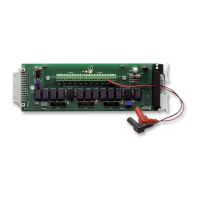Operation
3-30
3.13 Measurement considerations
Many measurements made with the DMM are subject to var-
ious effects that can seriously affect low-level measurement
accuracy. The following paragraphs discuss these effects and
ways to minimize them.
3.13.1 Thermocouple measurement error sources
The temperature measurement accuracy specification of the
Model 2001-TCSCAN is the sum of the following error
sources:
• Reference junction sensor error
• Temperature gradient across the card
• Relay offset voltage
• DMM measurement accuracy
• DMM temperature conversion algorithm
You can achieve better card performance by understanding
how these error sources contribute to the specification.
■ Reference junction sensor
The primary factor determining reference junction accuracy
is the operating temperature. By using the Model 2001-
TCSCAN in the 18°C to 28°C range, maximum sensor
performance is achieved. The Model 2001-TCSCAN may
also be used over 0°C to 18°C and 28°C to 50°C with
somewhat reduced accuracy. See the specifications at the
front of this manual for details.
■ Temperature gradient
Although the isothermal block minimizes temperature
gradients, a temperature gradient develops across the
connectors. This gradient contributes to the reference error
and is as follows:
• Channels 2–6: 0.22°C
• Channels 7–10: 0.55°C
When making relative temperature measurements and not
absolute measurements, it is advantageous to use adjacent
channels. Adjacent channels will have no more than the
following gradient between them:
• Channels 2–6: 0.05°C
• Channels 7–10: 0.07°C
■ Relay offset voltage
The primary source of offset voltage is the contact potential
of the relay, typically <500nV. Channels 2–4, 6–9 have the
lowest offset (1µV worst case), and channels 5 and 10 have
a somewhat higher offset (<2µV). For a type K thermocou-
ple, 1µV offset produces 0.024°C of error.
■ Measurement accuracy
The voltage measurement accuracy and temperature conver-
sion algorithm determine the accuracy of the instrument. The
DMM has these parameters combined with scanner card er-
rors. For type K thermocouples, the DMM has 0.7°C accura-
cy. The Model 2001-TCSCAN card is responsible for no
more than 0.48°C of these errors.
■ Temperature conversion algorithm
The DMM temperature conversion algorithm will contribute
0.07°C of error for a type K thermocouple.
■ Thermocouple wire errors
In most cases, the major source of error is the thermocouple
wire. For the standard grade of type K thermocouple wire,
the error is 2.2°C or 0.75%, whichever is greater. For the spe-
cial grade of type K wire, the error is 1.1°C or 0.4% error.
■ Low-temperature accuracy
Model 2001-TCSCAN temperature accuracy specifications
are given down to -100°C. For temperatures from -100.1°C
and -200°C using type J, K, T, or E thermocouples, add an
additional ±0.1°C of error.

